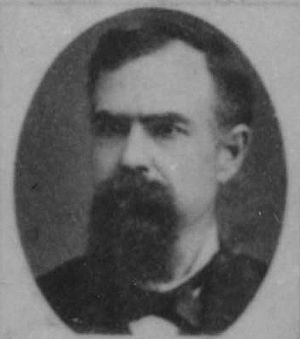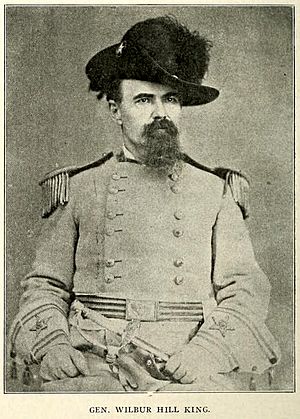Wilburn Hill King facts for kids
Quick facts for kids
Wilburn Hill King
|
|
|---|---|

King as a member of the Texas Legislature circa 1880
|
|
| Born | June 10, 1839 Culloden, Georgia |
| Died | December 12, 1910 (aged 71) Sulphur Springs, Texas |
| Buried | |
| Allegiance | |
| Service/ |
|
| Years of service | 1861–1865 |
| Rank | Assigned to duty as: Brigadier General |
| Battles/wars | American Civil War |
Wilburn Hill King (born June 10, 1839 – died December 12, 1910) was a brave soldier who fought as a colonel for the Confederate States Army during the American Civil War. He was even given the job of a brigadier general by General E. Kirby Smith, but this rank was never officially approved by the Confederate government.
Before the war, King was a lawyer and businessman. After the war, he became a lawyer again, served as mayor of Sulphur Springs, Texas, and was a state representative. He also held an important military role for the state of Texas.
Wilburn King's Early Life
Wilburn Hill King was born in Culloden, Georgia, on June 10, 1839. His parents were Alexander and Mary King. He studied both law and medicine in Americus, Georgia. King worked as a lawyer, a prospector (someone who searches for valuable minerals), and a businessman. In 1860, he moved to Cass County, Texas. However, he was working in Warrensburg, Missouri, when the Civil War began.
King married Lucy Furman in 1867.
Fighting in the Civil War
Wilburn Hill King joined the pro-Confederate Missouri State Guard very early in the war. He was chosen as a lieutenant in Company E of the 3rd Infantry Regiment. He quickly moved up to captain. King fought in the Battle of Carthage and the Battle of Wilson's Creek on August 10, 1861. At Wilson's Creek, he was wounded.
Soon after, he left that regiment and went back to Texas. There, he joined the 18th Texas Infantry Regiment as a private. In October 1861, he became a major and quartermaster (a supply officer) for a group of Texas regiments.
On May 13, 1862, King was elected major of the 18th Texas Infantry. He continued to be promoted, becoming a lieutenant colonel in 1863 and then a colonel later that year. His regiment was part of Major General John G. Walker's division.
In late 1863, King's regiment was temporarily moved to a cavalry division. On November 3, 1863, King led his regiment in a successful attack against a Union Army group at the Battle of Bayou Bourbeux.
King's regiment returned to Walker's division just in time for the Battle of Mansfield, Louisiana, on April 8, 1864. King's regiment helped defeat three Union Army divisions. King was badly wounded at the end of this battle.
On April 16, 1864, General E. Kirby Smith, who was the Confederate commander in the Trans-Mississippi Department, gave King the job of a brigadier general. Smith wanted King to lead a brigade (a large group of soldiers). However, King could not take this command until he recovered from his wound in October 1864.
King's appointment as a brigadier general by E. Kirby Smith was never officially confirmed by the Confederate government. This means that even though King acted as a general officer for more than a year, he was never legally promoted to that rank by Confederate President Jefferson Davis.
Life After the War
After the Civil War ended, Wilburn Hill King, like some other Confederate officers, went to Mexico. He then bought and ran a sugar plantation in Central America for a short time. King returned to the United States and married Lucy Furman in December 1867. The couple then went back to King's plantation in Central America.
Less than a year later, King returned to Texas to practice law. This was after his wife and infant child sadly passed away.
In 1875, King became the mayor of Sulphur Springs, Texas. He served as a state representative from 1878 to 1881. King then held the important position of Adjutant General of Texas (a top military officer for the state) from 1881 to 1891.
In 1891, he retired and returned to Sulphur Springs. There, he focused on his work with the Masonic Order, a fraternal organization.
Wilburn Hill King passed away in Sulphur Springs, Texas, on December 12, 1910. He was buried in Oakwood Cemetery in Corsicana, Texas. His funeral included Methodist religious services and a Masonic burial.
 | Janet Taylor Pickett |
 | Synthia Saint James |
 | Howardena Pindell |
 | Faith Ringgold |


